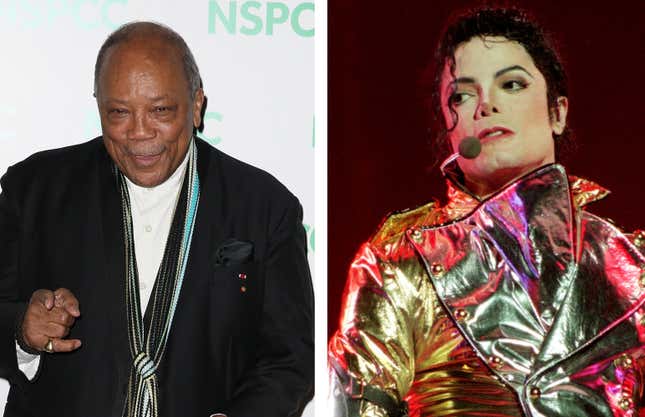
Quincy Jones’ influence on Black music can be heard across multiple generations and genres. However, there’s one artist to whom his name will always be inextricably linked: Michael Jackson. The maestro was the producer behind “Off the Wall,” “Thriller” and “Bad.”
Of course, anytime something is as successful as these albums, money can get complicated. According to RadarOnline, in 2013, the legendary composer was locked in a royalty dispute with Jackson’s estate.
Jones alleged the “Beat it” singer’s estate stopped a deal he and Michael had “to increase his royalty share.” He sued Sony Music Entertainment, MJJ Productions, which is controlled by Jackson’s estate, and Epic Records, for $10 million, claiming he was owed “unpaid royalties and fees” for his work on the three classic recordings.
After the King of Pop’s death, Jones reportedly alleged Jackson’s estate “negotiated a larger share of the profits with Sony Entertainment and cut him out of the deal.” Due to a “minor accounting error,” the famed musician was allegedly offered a $3 million settlement, Though Jones believed he was really owed $30 million, in 2017, he was awarded $9.42 million by a jury.
“The Color Purple” producer claimed that “the master recordings he produced were edited and remixed as a way to avoid paying him his due.”
According to MSN, the dispute also involved the film “This Is It,” which chronicled the production of Jackson’s 2009 London concert residency. Though the project featured several of the hits they created together, Quincy felt the movie didn’t “provide adequate compensation or credit for his role in those works.”
Jackson was already an extremely popular, successful artist before he worked with Jones on the albums. But we can’t deny that the great producer’s influence on his sound helped catapult Jackson to a very rare level of global impact.
Jones made sure he let Michael’s family know “he held no grievances against Jackson or his family.” He allegedly had the Jackson family’s support as he battled “mismanagement of his royalties and production credits,”
We understand that the essential function of the executors of Michael Jackson’s estate is protect the artist’s interests and legacy on behalf of his heirs. However, it’s pretty clear to anyone who’s ever heard “Off the Wall,” “Thriller,” or “Bad,” there would be no King of Pop without Quincy Jones.

